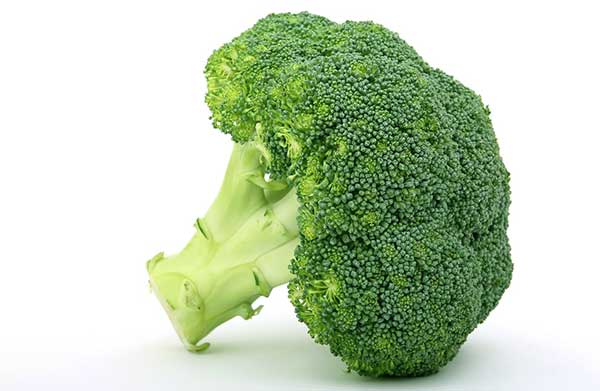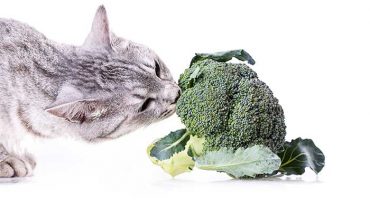Broccoli is one of the most nutritious vegetables out there. With an abundance of essential vitamins like Vitamin C and K, as well as vital minerals like potassium and fiber, there appears to be plenty of reasons why you might want to introduce broccoli into your diet.
However, could the same be said of our feline friends? Can cats eat broccoli? Well, it all depends on the quality, quantity and how the vegetable is served.
Read on for more insights on when broccoli might be ideal for your cat, and when not.
Table of Contents
What’s In Broccoli?
The best way to answer the question “can cats have broccoli?” is to begin by understanding the nutritional value of broccoli.
First and foremost, vitamin C, which is the most abundant vitamin in broccoli helps prevent and heal various illnesses. It is instrumental in the repair and development of body tissues and also facilitates the formation of collagen for faster healing of wounds.
And together with calcium, vitamin C helps prevent and cure both oral and periodontal diseases.
Other essential vitamins in broccoli include vitamins K and B6, while minerals include magnesium, zinc, iron, and phosphorus.
Broccoli contains antioxidants such as zeaxanthin and lutein. These antioxidants help eliminate cell damage that is caused by the accumulation of free radicals. As a result, incidences of inflammation are reduced, and debilitating diseases like cancer are kept at bay. Overall, your cat’s immune system receives a massive boost.
Studies also point out to the role of broccoli in reducing triglyceride levels as well as “bad” LDL cholesterol. These effects are key in preventing cases of heart and cardiovascular diseases such as heart attack, heart disease as well as oxidative stress and cell death.
As it contains plenty of fiber and roughage, broccoli helps regulate your cat’s digestive system. Cats that experience digestive problems like nausea, constipation, and diarrhea can greatly benefit from a few leaves of this vegetable.
Interestingly, broccoli has also been associated with an improvement in mental function. It helps manage conditions like dementia and reduced brain function, especially among aging cats.
Essential compounds found in broccoli, such as kaempferol and sulforaphane, have been shown to reduce incidences of brain injury and prevent nerve damage, especially in the wake of a stroke. As a result, they could also help prevent premature aging or generally slow down the aging process.
But in spite of all these possible nutritional benefits, is broccoli good for cats? Like we mentioned earlier, cats do not require broccoli to survive. Being obligate carnivores, they obtain all their nutritional elements from meat. Even worse, broccoli could come with possible side effects to your cat.
Possible Risks of Serving Broccoli to Your Cat
We have already seen the possible health and nutritional benefits broccoli could have to your cat. Your next question is probably, is broccoli bad for cats?
Well, there are notable side effects of serving broccoli to your cat.
Just by virtue of cats being obligate carnivores, broccoli might not have any significant nutritional benefits to them over and above what the cat gets from their regular diet of meat.
Therefore, it beats logic that you would introduce a new food to her diet when she gains no significant nutrition out of it. And much worse if the food is not her staple diet.
So while broccoli packs quite essential minerals and vitamins, your cat may experience difficulty absorbing these minerals into her system.
Another reason why you might want to think twice before feeding broccoli to your feline is because of possible allergic reactions. You have probably watched your cat throw up as soon as she nibbles on greens. The same could happen if you serve broccoli to her.
The last reason why cat eating broccoli may not be a great idea is that since its gut is not used to the vegetable, there could be instances of chocking. This is especially true if the vegetable is served raw and not thoroughly cleaned, and therefore contains lots of debris attached to it.
How Best Should You Serve Broccoli To Your Cat?
You can choose to serve broccoli to your cat either raw or cooked. Which directly leads us to the question- can cats eat raw broccoli?
First, before cooking your broccoli, you would naturally wash it first. Washing helps eliminate any debris that may be attached to broccoli leaves that if not otherwise removed, could choke your cat.
Washing also helps reduce the level of toxic pesticides. Above all, washing the vegetable lowers the occurrence of food-borne diseases caused by harmful bacteria like E. coli, Salmonella and Listeria.

Another benefit of serving cooked broccoli to your cat is that cats have no digestive enzymes that can effectively break down raw broccoli.
When it comes to cooking your broccoli, it is imperative that you choose the right cooking method.
Generally, experts encourage boiling or steaming. This is because they help keep all the nutritional elements intact while also eliminating harmful bacteria.
So, under what conditions might your cat eat raw broccoli?
If you are serving the vegetable clean and in very small amounts, then raw broccoli is just fine.
Another point worthy of noting is that the most edible parts of broccoli include broccoli florets, broccoli leaves and sprouts. So, you might be wondering, can cats eat broccoli sprouts?
? Well, if you’re thinking of serving broccoli to your feline, you are better off going for broccoli sprouts. This is because studies indicate broccoli sprouts have up to 100 times the amount of antioxidants. What of leaves? Can cats eat broccoli leaves?
Cats can definitely eat broccoli leaves. But if you are keen on leveraging the high antioxidant properties of broccoli, you might consider broccoli sprouts instead.
What’s Our Takeaway?
Serving broccoli to your cat is not a bad idea as such. However, moderation is key.
Never make broccoli part and parcel of your cat’s diet as felines are naturally carnivores. And if you must add the vegetable to her diet, ensure you boil or steam it first, and add no condiments or seasoning to it.
Either way, introduce broccoli to your cat in small, measured doses as you watch her reaction. If the reaction is too extreme, withdraw the food immediately and take your cat to the vet. If she develops a liking for broccoli rabe, you might consider using it occasionally as a treat.


